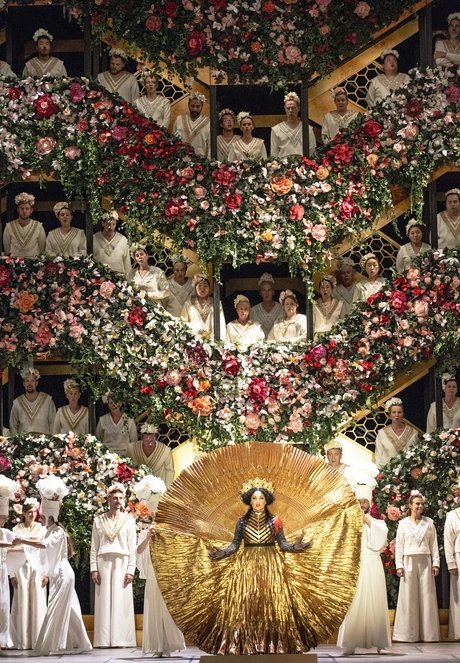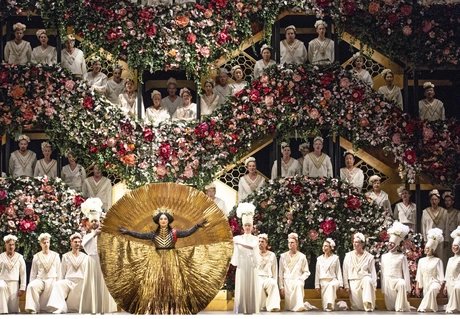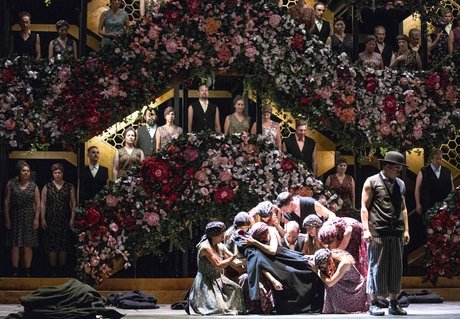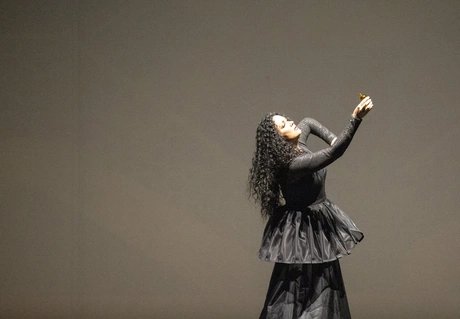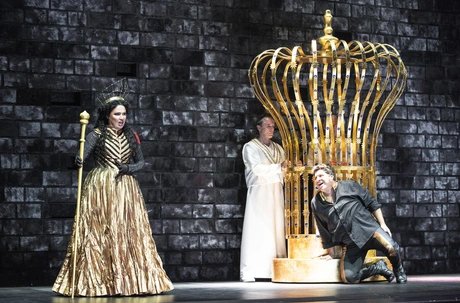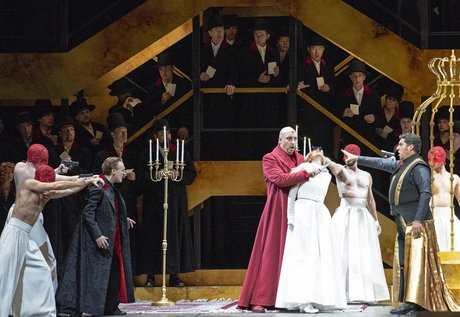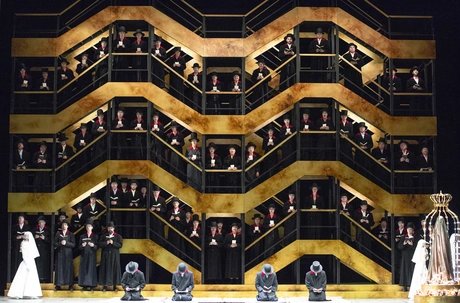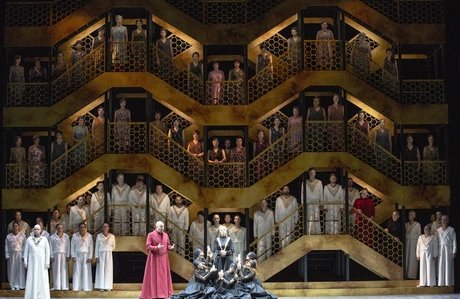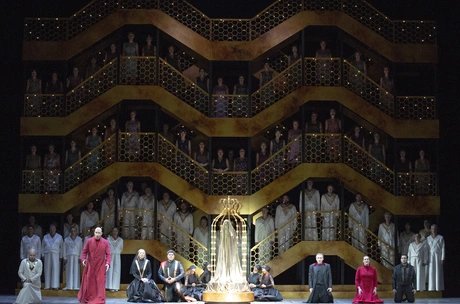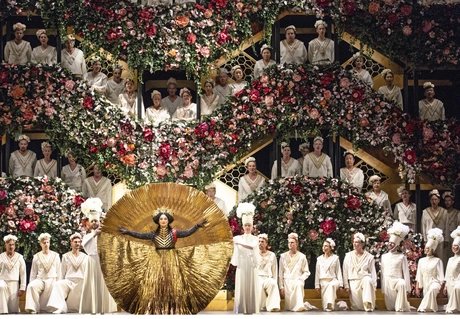
Lyrical drama in four parts (1842)
His first major success and breakthrough: Nabucco, premiered at La Scala in Milan in the spring of 1842, marked the beginning of Giuseppe Verdi's brilliant career, which would go on to dominate Italian opera almost unrivaled for several decades.
Set in biblical times in Jerusalem and Babylon, the work explores the fate of two peoples and cultures, as well as the hubris of the eponymous ruler, who, in his excessive self-aggrandizement, elevates himself to the status of a god and ultimately descends into madness.
Magnificent tableaux of solemn dignity and haunting music – above all the famous chorus of the captive Hebrews, "Va, pensiero" – interplay with scenes of gripping intensity, permeated with drama and passion.
For the first time, the renowned opera, theater, and film director Emma Dante directs at the State Opera, while the accomplished Verdi interpreter Bertrand de Billy conducts this impressive and captivating work.
- Duration: Approx. 2:40 hours including one intermission
- Language: In Italian with German and English subtitles
- Recommended age: 14 years and up
Additional information
Part One
Jerusalem – The Babylonian king Nabucco and his troops besiege Jerusalem. The Hebrews gather at Solomon’s temple to pray for God’s help. The High Priest Zaccaria insists that they do not give up hope, since they are holding Nabucco’s daughter Fenena hostage. She once freed Ismaele, the nephew of the king of Jerusalem, in Babylon and followed him out of love back to the city. But now, Ismaele wants to help her flee. The plan is thwarted by Fenena’s sister Abigaille, who is able to get into the temple with her Babylonian soldiers thanks to a disguise. Not only Fenena, but Abigaille also loves Ismaele. She presents him with a choice: if he were ready to return her love, she would be ready to protect him and his people. But Ismaele cannot declare his love for her. By now, Nabucco has taken the city. Zaccaria wants to protect the temple from desecration and threatens the Babylonian king with Fenena’s execution. Out of love for Fenena, Ismaele disarms the High Priest and thus seals the fate of his people. Nabucco orders the destruction of the temple.
Part Two
The Impious One – Back in Babylon, Abigaille discovers a secret document that reveals her true origin. As the daughter of a slave, she is not Nabucco’s legal successor: Fenena is. The king has transferred the rule over Babylon to Fenena during his absence, and she decides to free the imprisoned Hebrews. Horrified by this, the priests of Baal decide to support Abigaille: by spreading the fictive news of Nabucco’s death, Abigaille is to seize power.
The Levites blame Ismaele for the imprisonment of the Hebrews. But Zaccaria calls on all to forgive and announces that Fenena has converted to the Jewish faith. After the news of Nabucco’s supposed death is announced, Abigaille demands the crown from Fenena. But suddenly, the supposedly dead king himself appears and demands that he should now be worshipped as the only God. The blasphemer is struck by lightning and punished with madness. Abigaille seizes the moment and takes the crown.
Part Three
The Prophecy – Deceived by Abigaille’s deception, Nabucco, who has still not regained his wits, signs the death sentence for the Hebrews. He realizes that he has just sealed the fate of his daughter Fenena. When he threatens Abigaille with revealing her true origins, she destroys the documentation of her mother’s identity before Nabucco’seyes and has the king arrested.
Full of sadness and longing, the imprisoned Hebrews recall theirhomeland. Zaccaria prophesies a better future and calls on them to summon new courage.
Part Four
The Broken Idol – When the imprisoned Nabucco learns that theexecution of the Hebrews and Fenena is being planned, he pleads to the God Jehovah and asks for forgiveness. With the assistance of his officer Abdallo, he succeeds in freeing himself.
Nabucco prevents the execution and has the idol of Baal destroyed. He grants the prisoners freedom and promises to erect a new temple for Jehovah. The dethroned Abigaille has taken poison and dies, after beseeching Fenena for forgiveness.
Jerusalem – The Babylonian king Nabucco and his troops besiege Jerusalem. The Hebrews gather at Solomon’s temple to pray for God’s help. The High Priest Zaccaria insists that they do not give up hope, since they are holding Nabucco’s daughter Fenena hostage. She once freed Ismaele, the nephew of the king of Jerusalem, in Babylon and followed him out of love back to the city. But now, Ismaele wants to help her flee. The plan is thwarted by Fenena’s sister Abigaille, who is able to get into the temple with her Babylonian soldiers thanks to a disguise. Not only Fenena, but Abigaille also loves Ismaele. She presents him with a choice: if he were ready to return her love, she would be ready to protect him and his people. But Ismaele cannot declare his love for her. By now, Nabucco has taken the city. Zaccaria wants to protect the temple from desecration and threatens the Babylonian king with Fenena’s execution. Out of love for Fenena, Ismaele disarms the High Priest and thus seals the fate of his people. Nabucco orders the destruction of the temple.
Part Two
The Impious One – Back in Babylon, Abigaille discovers a secret document that reveals her true origin. As the daughter of a slave, she is not Nabucco’s legal successor: Fenena is. The king has transferred the rule over Babylon to Fenena during his absence, and she decides to free the imprisoned Hebrews. Horrified by this, the priests of Baal decide to support Abigaille: by spreading the fictive news of Nabucco’s death, Abigaille is to seize power.
The Levites blame Ismaele for the imprisonment of the Hebrews. But Zaccaria calls on all to forgive and announces that Fenena has converted to the Jewish faith. After the news of Nabucco’s supposed death is announced, Abigaille demands the crown from Fenena. But suddenly, the supposedly dead king himself appears and demands that he should now be worshipped as the only God. The blasphemer is struck by lightning and punished with madness. Abigaille seizes the moment and takes the crown.
Part Three
The Prophecy – Deceived by Abigaille’s deception, Nabucco, who has still not regained his wits, signs the death sentence for the Hebrews. He realizes that he has just sealed the fate of his daughter Fenena. When he threatens Abigaille with revealing her true origins, she destroys the documentation of her mother’s identity before Nabucco’seyes and has the king arrested.
Full of sadness and longing, the imprisoned Hebrews recall theirhomeland. Zaccaria prophesies a better future and calls on them to summon new courage.
Part Four
The Broken Idol – When the imprisoned Nabucco learns that theexecution of the Hebrews and Fenena is being planned, he pleads to the God Jehovah and asks for forgiveness. With the assistance of his officer Abdallo, he succeeds in freeing himself.
Nabucco prevents the execution and has the idol of Baal destroyed. He grants the prisoners freedom and promises to erect a new temple for Jehovah. The dethroned Abigaille has taken poison and dies, after beseeching Fenena for forgiveness.
Participating artists
Giuseppe Verdi (Komponist/in)
Temistocle Solera (Autor/in)
Dates
May 2026
| Mo | Tu | We | Th | Fr | Sa | Su |
|---|---|---|---|---|---|---|
1
|
2
|
3
| ||||
4
|
5
|
6
|
7
|
8
|
9
|
10
|
11
|
12
|
13
|
14
|
15
|
16
|
17
|
18
|
19
|
20
|
21
|
22
|
23
|
24
|
25
|
26
|
27
|
28
|
29
|
30
|
31
|



